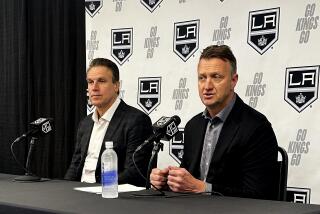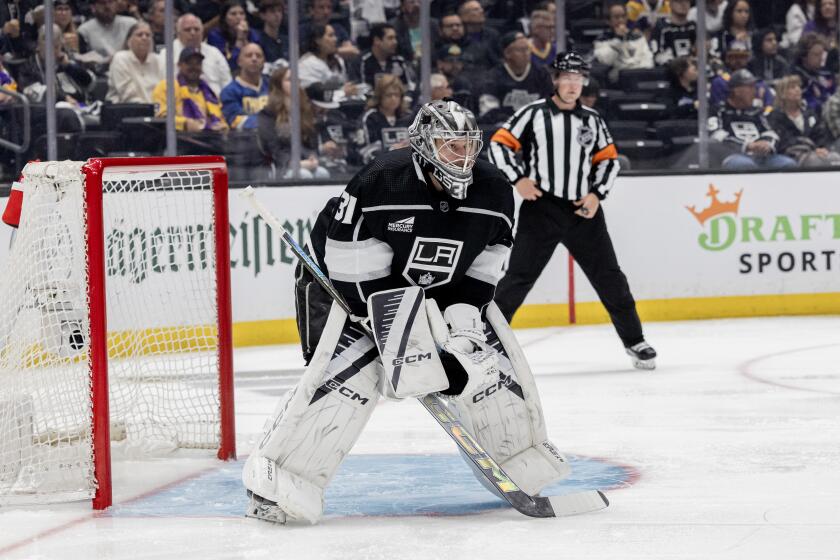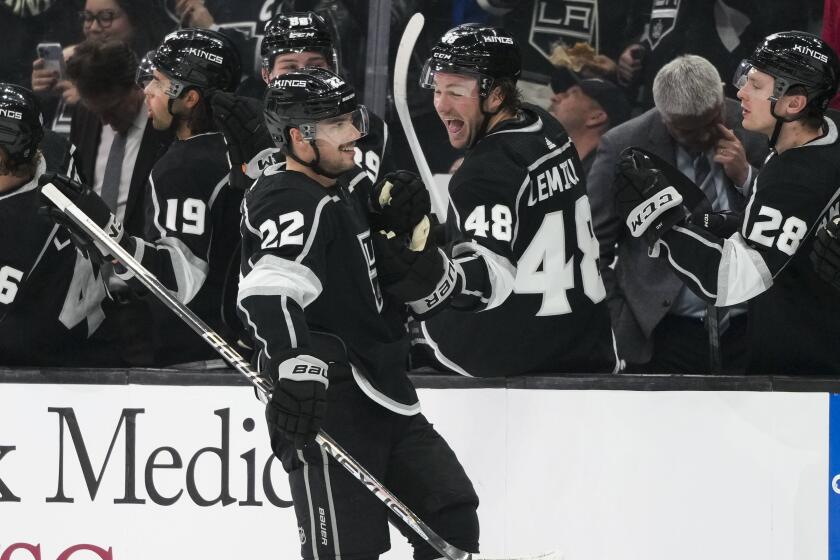Time to Sell Ducks?
With the Walt Disney Co. scrambling to cut costs, the time might well be right to sell the Angels. But, although they’re a rousing success at the box office and at the gift shop, the time might also be right to sell the Mighty Ducks.
The Angels have run up more than $42 million in operating losses during three seasons of Disney management, and a high-ranking baseball source has confirmed the company is considering a franchise sale.
The Ducks never again can reap the financial windfall that accompanied their arrival in the NHL. If Disney believes selling the Ducks can boost the financial health of the company, there might never be a more opportune time to sell.
“If that’s the consideration, this is the perfect time to get out,” an NHL source said Wednesday.
Although Duck President Pierre Gauthier estimated an $8-million loss last season, the hockey team made money in each of its five previous seasons.
But a projected payroll increase next season means another projected deficit in a sport in which, according to Denver sports marketing consultant Dean Bonham, salaries are growing between 5% and 20% faster than revenues each year.
“If you’re looking at the Ducks on a stand-alone basis, you could make a very compelling argument why now is the time to sell,” Bonham said.
In trying to generate additional revenue and keep pace with spiraling salaries, the Ducks are victims of their own success.
Sell more tickets? The Ducks have sold out two of every three games at the Arrowhead Pond of Anaheim.
Sell more merchandise? The Ducks are one of the best sellers in the history of professional sports, ranking behind only the Chicago Bulls and Dallas Cowboys among North American pro teams in one recent year.
Generate more television revenue? The new NHL deal with ABC and ESPN--also part of the Disney empire--will pay each team less than $5 million per year, essentially covering the salary of goaltender Guy Hebert and his backup.
Generate advertising and merchandising revenue from the Internet, as suggested by Sean Brenner of Team Marketing Report? Disney loves the Internet, but the revenue streams won’t flow immediately.
Raise ticket prices? The Ducks have done that after each of their six seasons. The average ticket price has jumped from $28.64 in the inaugural 1993-94 season to $42.56 for 1999-2000, an increase of 49%. However, the player payroll has soared from $8 million to $31 million, up 287%.
“We pay the players too much money” relative to revenues, said Gauthier, who declined to discuss a potential franchise sale. “The only answer we have is our own resolve.”
With the current labor agreement extending until 2004, the NHL in the meantime faces the unappealing dilemma of watching salary escalation continue unchecked or risking a season-stopping lockout.
In addition, with the possibility that several Canadian teams could eventually come on the market in the absence of long-sought tax relief, Disney could maximize bids for the Ducks by selling sooner rather than later.
Said Bonham: “Are they ever going to have an environment in which they can make more money? Not in the foreseeable future.”
So why not cash out? Disney paid $50 million to join the NHL, and the franchise value has appreciated to $110 million, according to Forbes magazine. An NHL source also said that, despite the $8-million loss last season, the Ducks are believed to have returned a cumulative operating profit of $25 million to $30 million, including a profit of $11 million to $13 million in the first season.
“They could probably make a pretty compelling case for it being in their best financial interest to sell now,” Bonham said. “But why did they own them in the first place?”
That answer, Bonham suggested, includes synergy, the term Disney embraces to describe using one company asset--in this case, the Ducks--to promote other assets like Disneyland, movies and ABC and ESPN television shows.
However, Disney could negotiate a sale agreement that would allow the company to retain licensing and merchandising interests in the Ducks.
The one option Disney Chairman Michael Eisner will not endorse is slashing payroll for the purpose of turning a profit while fielding an awful team.
“We have a commitment to win,” Gauthier said. “When you win, the revenue increases in many areas.”
“We’re trying to win. That’s my mandate. It has not changed.”
More to Read
Go beyond the scoreboard
Get the latest on L.A.'s teams in the daily Sports Report newsletter.
You may occasionally receive promotional content from the Los Angeles Times.






